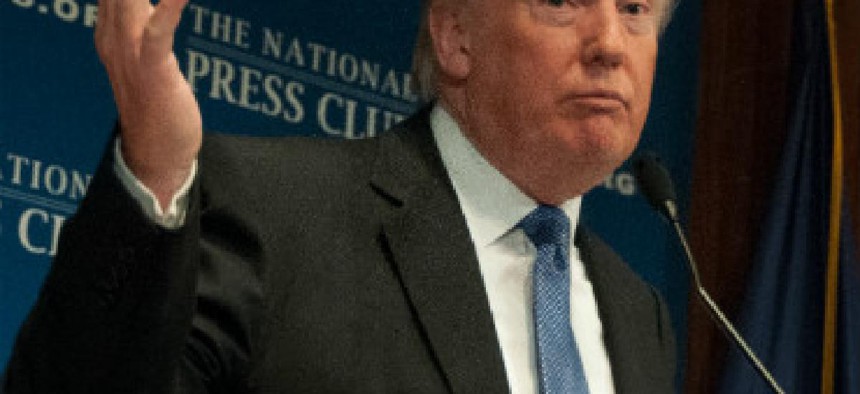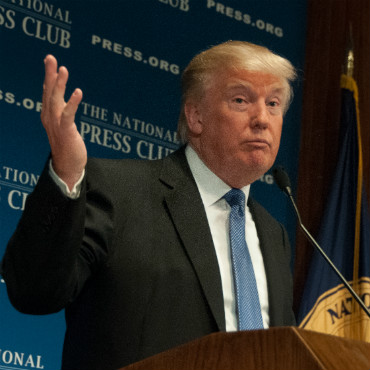Donald Trump and federal procurement: Who woulda thunk it?

Steve Kelman notes that acquisition issues have surfaced twice already for the next administration.

Those of us working around government contracting have the burden of operating way off in the wonky weeds. Normally, people outside the procurement system have no knowledge of or interest in government contracting. This can be frustrating for anyone who likes to have their work generate wider buzz, though for others the obscurity provides an opportunity to work with less distraction and hoopla.
President-elect Donald Trump is nothing if not a showman, so government contracting is far, far down any list of areas in which he might be expected to engage. Indeed, I asked in a blog post just after the election whether there would be any Trump management agenda at all, given his likely lack of interest and the minimal support he received during the from Republican government management experts in Washington.
However, Alan Balutis responded with an overview of a plausible management agenda for the next administration. And in an astonishing turn of events, Trump has become involved in not one but two procurement issues, even before assuming office.
The first is the suggestion that Trump’s contract with the General Services Administration to manage the Old Post Office will violate procurement law when he assumes office. The second is the suggestion that part of how he got Carrier Corp. Officials to agree to keep air conditioning jobs in Indiana was by saying that otherwise, the military contracts of Carrier’s parent corporation, UTC, might be in danger.
The issue of the Old Post office lease was initially raised in a Nov. 15 op-ed in the Washington Post by two old friends -- Steve Schooner, a well-known public contracts law professor at George Washington Law School, and Dan Gordon, President Barack Obama’s first Office of Federal Procurement Policy Administrator (and before that long-time head of bid protests at the Government Accountability Office). There is a prohibition in the procurement regulations against the government entering into a contract with a government employee, to avoid the ability of the employee to profit personally from the award of a public contract.
The Trump-GSA contract included analogous language that “no … elected official of the Government of the United States … shall be admitted to any share or part of this Lease, or to any benefit that may arise therefrom.” In Gordon and Schooner's view, the contract language is plain, and on Jan. 20 the contract will come to violate the prohibition. GSA should terminate the contract, they argued, even if it means having to pay the Trump organization some monetary damages.
The specifics of the original Trump-GSA contract don’t fit the rationale for the underlying prohibition – the contract was awarded well before Trump became an elected official, so there can be no suggestion that it was awarded to allow him to profit. They make a stronger argument that is forward-looking, involving ongoing changes to the contract provisions, such as what rent GSA charges: Will a GSA official be a hard negotiator when the President, or his family, is ultimately at the other side of the table? One might be able to deal with this problem by having contract modifications decided by an arbitrator, rather than requiring Trump to give up the contract.
This issue, as befits government contracting, is quite technical. When the Atlantic republished a piece Schooner and Gordon wrote about the Old Post Office lease, they noted it was a “somewhat dense, technical look at contract law.” Yet nonetheless, Trump now finds himself in the middle of a procurement policy issue. Although neither Trump nor a spokesman have spoken about this, six congressional Democrats have picked up on the issue, writing the GSA administrator and urging that the agency should terminate the contract.
As if that’s not enough procurement percolating in the Trump transition, a second issue arose last week after Trump negotiated a deal with Carrier not to send jobs to Mexico as originally planned. A number of press accounts of the genesis of the deal, including a statement by an Indiana state official, have suggested that a key element was the suggestion that Carrier’s parent company, UTC, might lose military contracts with the government if the jobs in question moved. (UTC is a supplier for a number of weapons systems.)
Trump may see this as the art of the deal, but contracting regulations – Part 15.305 of the Federal Acquisition Regulation, to be specific -- are clear that the government may make contract award decisions based only on factors that have been announced in advance when the government puts the contract out to bid. If UTC is competing for a military contract, the government is not allowed to base its decision in any way on where the company’s production is taking place unless it says up front that this will be a factor considered.
There are a number of reasons for this policy. It gives bidders more confidence if they bid that they know more about the grounds for awarding the contract, and thus encourages more competition, which is in the government’s and taxpayers’ interests. It is part of a bedrock feature of federal contracting that contract award decisions should not be made on undisclosed political grounds.
Ironically, as I noted in a blog post last March, Trump himself was a beneficiary of this feature of federal contracting when he won the Old Post Office contract. At the time he won, he had already been the high-profile leader of the “birther” movement that questioned whether President Obama had been born in the U.S. In many countries, such attacks on the country’s political leadership would have precluded someone from receiving a government contract, let alone one as high-profile as the Old Post Office renovation. In our system, with such considerations not allowed in making contract award decisions, Trump was able to win.
Again, there have been no statements from Trump people about whether Carrier’s military contracts were raised to help persuade UTC to retain the Carrier jobs in the United States. But again Donald Trump has found himself in the middle of a contracting issue.
Coincidence? Or maybe related to the fact that Trump is a dealmaker and that contracts, of course, are deals? Who knows? But maybe, just maybe, contracting may be headed for emergence from its long-standing status as sleep-inducer.
NEXT STORY: Senators press GSA on Trump hotel lease


